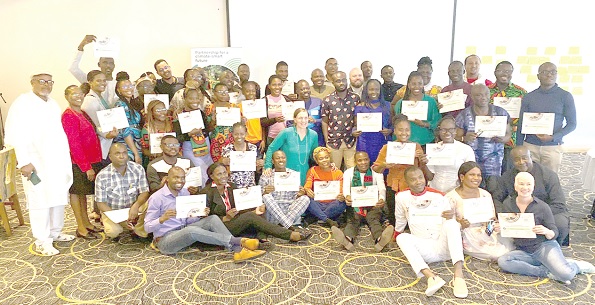
Media urged to concentrate more on agric sector
The media in Ghana and other African countries have been called upon to set the agenda for strategic investments in innovations that will help tackle the negative impacts of the global climate crisis on the continent.
Advertisement
A development consultant and systems scientist, Sabrina Trautman, who made the call, said the African media must shift from being reactive in communicating the climate crisis to a more proactive approach that focused on highlighting innovations and solutions, particularly in the agriculture sector.
Again, she stressed that instead of waiting to report on loss and damages associated with climate change, journalists in Africa needed to be proactive by doing investigative and impactful stories on the root causes of climate-related crisis to help avert them.
“Journalists should be able to do stories that say ‘I can see danger looming; I can see trees being cut down; farmers are polluting waterbodies; I can see flood risks; because such stories call for action to be taken to address the dangers through policy,” she added.
Ms Trautman made the call at a 2-day conference on climate change organised by Accelerating Impacts of CGIAR Climate Research for Africa (AICCRA) for selected African journalists and communicators in South Africa.
Conference objectives
The AICCRA spring school, which was held in collaboration with the International Water Management Institute (IWMI), drew participants from Ghana, Kenya, Zambia, South Africa, Senegal, Mali and Ethiopia, who converged on Cape Town to explore the impacts of the global climate crisis on agriculture and the way forward.
AICCRA works to deliver a climate-smart African future driven by science and innovation in agriculture.
The conference sought to unpack the impact of climate change on African agriculture and food systems, explore how to transform African agriculture and food systems for a more sustainable and climate-resilient future and discuss national, regional, continental and global initiatives to promote climate-smart agriculture.
It was also aimed at strengthening the capacity of participants in understanding how to develop communications strategies, and develop messages as well as share skills on how to use digital tools to create compelling content for communications channels.
Communicate climate crisis
Ms Trautman, who was the lead facilitator at the AICCRA conference, said journalists needed to understand the complex concepts and issues surrounding climate change and break them into simpler messages for members of the public, especially small-holder farmers.
“There are so many innovations happening in Africa at the farm and community levels that need to be highlighted and journalists need to be change makers that will communicate these innovations in the most effective way,” she said.
She also urged journalists on the continent to collaborate and work on climate-related stories that cut across African countries, noting that such collaborations would help to address the challenges in a holistic manner.
Climate smart agriculture
The Global Communications and Knowledge Manager of AICCRA, Rhys Bucknall-Williams, stressed that it was important for African countries to prioritise investment in climate-smart agriculture initiatives because that was the surest ways to ensure food security.
He urged the media and other development partners to make investment in innovative climate services for small-holder farmers a talking point so as to help shift negative perceptions and ensure commitment from leaders.
“We need to do more; we need to do it faster to help small-holder farmers.
We have the power to shape the global conversation on climate change,” he stressed.




